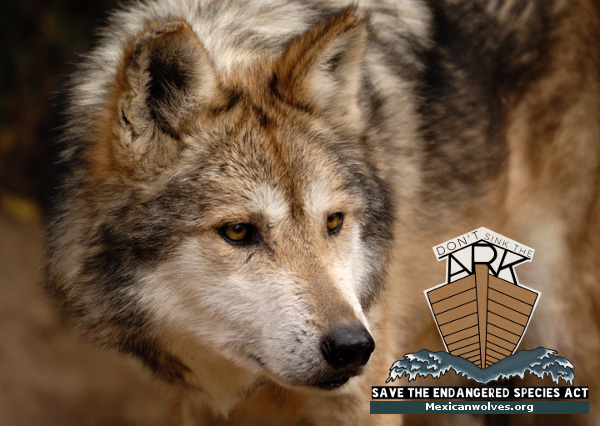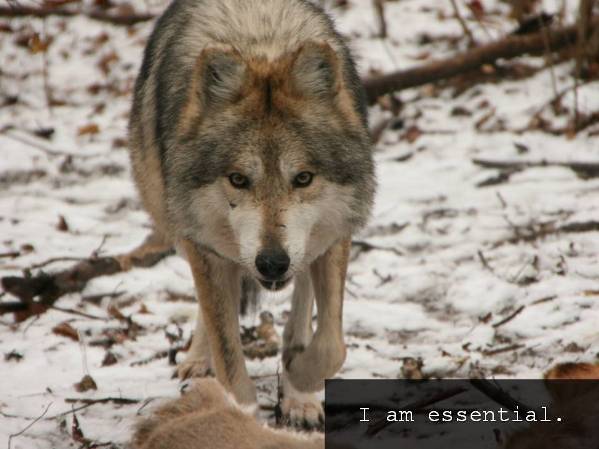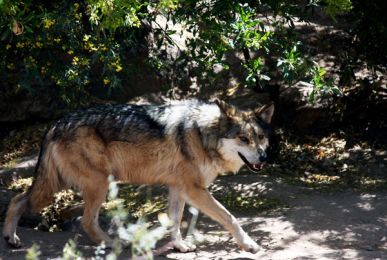18
Nov
Mexican Wolf Reintroduction Project News

Endangered Species Updates
November 15, 2018
Mexican Wolf Reintroduction Project Monthly Update
October 1-31, 2018
The following is a summary of Mexican Wolf Reintroduction Project (Project) activities in the Mexican Wolf Experimental Population Area (MWEPA) in Arizona, including the Fort Apache Indian Reservation (FAIR), San Carlos Apache Reservation (SCAR), and New Mexico. Additional Project information can be obtained by calling (928) 339-4329 or toll free at (888) 459-9653, or by visiting the Arizona Game and Fish Department website at www.azgfd.gov/wolf or by visiting the U.S. Fish and Wildlife Service website at www.fws.gov/southwest/es/mexicanwolf. For information on the FAIR call (928) 338-4385 ext. 226 or visit www.wmatoutdoors.org.
Past updates may be viewed on these websites. Interested parties may sign up to receive this update electronically by visiting www.azgfd.com and clicking on the E-news Signup tab on the top left corner of the webpage.
This update is a public document and information in it can be used for any purpose. The Project is a multi-agency cooperative effort among the Arizona Game and Fish Department (AZGFD), USDA Forest Service (USFS), USDA-Animal and Plant Health Inspection Service, Wildlife Services (USDA-APHIS WS), U.S. Fish and Wildlife Service (USFWS) and the White Mountain Apache Tribe (WMAT).
To view semi-monthly wolf location information please visit http://arcg.is/0iGSGH.
Please report any wolf sightings or suspected livestock depredations to: the Alpine wolf office at (928) 339-4329, Pinetop wolf office at (928) 532-2391 or toll free at (888) 459-9653. For sightings or suspected depredations on the FAIR, please call the FAIR wolf office in Whiteriver at (928) 388-4385 ext. 226. To report incidents of take or harassment of wolves, please call the AGFD 24-hour dispatch (Operation Game Thief) at (800) 352-0700.
Overall Mexican Wolf Recovery Program Monthly Update
Brady McGee started as the Mexican Wolf Recovery Coordinator on October 1. For the last four years, Brady has served as the USFWS Southwest Region’s Chief for the Branch of Recovery and Restoration. Overall, he has worked in the Southwest Region since 2001 and has extensive experience with the Endangered Species Act, Mexican wolves and the challenges of wolf recovery in the Southwest. Brady has a Masters in Wildlife Biology from Texas State University and a Doctorate degree in Wildlife Science from Texas Tech University.
During October, Brady discussed the Mexican Wolf Program with a variety of cooperators and individuals. Brady will continue to conduct meetings with cooperators and individuals in November to develop a broad understanding of the Program.
Numbering System: Mexican wolves are given an identification number recorded in an official studbook that tracks their history. Capital letters (M = Male, F = Female) preceding the number indicate adult animals 24 months or older. Lower case letters (m = male, f = female) are used to indicate wolves younger than 24 months. A lower-case letter “p” preceding the number is used to indicate a wolf pup born in the most recent spring. The capital letter “A” preceding the letter and number indicate breeding wolves.
Our note: You will notice that some of the wolves also have names associated with their identification numbers. For the last five years we had a Pup Naming Contest for Kids to name the pups born in the Spring. The names that you see are the winning names that we have assigned to the pups. Follow these links for all the entries and results from the 2012 contest, 2013 contest, 2014 contest, 2015 contest, 2016 contest, and 2017 contest.
Definitions: A “wolf pack” is defined as two or more wolves that maintain an established territory. In the event that one of the two alpha (dominant) wolves dies, the remaining alpha wolf, regardless of pack size, retains the pack status. The packs referenced in this update contain at least one wolf with a radio telemetry collar attached to it. Studbook numbers listed in the monthly update denote wolves with functioning radio collars. The Interagency Field Team (IFT) recognizes that wolves without radio telemetry collars may also form packs. If the IFT confirms that wolves are associating with each other and are resident within the same home range, they will be referenced as a pack.
CURRENT POPULATION STATUS
The year-end minimum population count for 2017 was 114 wolves in the wild in Arizona and New Mexico. Annual surveys are conducted in the winter as this is when the population experiences the least amount of natural fluctuation (i.e. in the spring the population increases dramatically with the birth of new pups and declines throughout the summer and fall as mortality is particularly high on young pups). Thus, the IFT summarizes the total number of wolves in the winter at a fairly static or consistent time of year. Counting the population at the end of each year allows for comparable year-to-year trends at a time of year that accounts for most mortality and survival of young pups. At the end of October, there were 84 wolves with functioning radio collars that the IFT was actively monitoring.

IN ARIZONA:
Bear Wallow Pack (collared Poco-AM1338 and Denali-f1683)
In October, the IFT documented the Bear Wallow Pack in their territory on the east central portion of the Apache-Sitgreaves National Forest (ASNF) and occasionally on the SCAR and the FAIR. Yearling f1683 and AM1338 were documented traveling separately.
Bluestem Pack (collared Crescita-f1686)
In October, the IFT documented the Bluestem Pack in the pack’s traditional territory in the east central portion of the ASNF. Yearling f1686 made dispersal movements from the pack’s territory this month within the eastern portion of the ASNF. The IFT initiated a diversionary food cache toward the end of the month in an effort to reduce potential for conflict with livestock.
Eagle Creek Pack (collared M1477)
In October, M1477 continued to be documented traveling with an uncollared wolf in a territory in the east central portion of the ASNF.
Elk Horn Pack (collared AF1294, Koa-f1668, Volver-m1671, fp1697, and fp1696)
In October, the Elk Horn Pack was located within their traditional territory in the northeastern portion of the ASNF. A female pup, fp1696, was captured, collared, and released in October.
Hoodoo Pack (collared Copper-AM1290, Verde-AF1333, Severus-m1666, Memphis-m1677, Suess-m1681, and mp1789)
In October, the Hoodoo Pack was located within their traditional territory in the northeastern portion of the ASNF.
Panther Creek Pack (collared Fuerza-AM1382)
Panther Creek AM1382 was not located during the month of October.
Pine Spring Pack (collared AM-1394, Atira-AF1562, fp1794, and fp1825)
In October, the Pine Spring Pack was located within their territory in the north central portion of the ASNF and occasionally in the north eastern portion of the FAIR. The IFT maintained a diversionary food cache for this pack to reduce potential for wolf-livestock conflict. A female pup, fp1825, was captured, collared and released in October.
Prime Canyon Pack (collared Faith-AF1488, Blaze-AM1471, mp1790, fp1791, and fp1823)
In October, the IFT documented the Prime Canyon Pack within their territory in the east central portion of the ASNF. The IFT maintained a diversionary food cache for this pack in a proactive attempt to reduce the potential for human-wildlife interactions near residences. A female pup, fp1823 was captured, collared, and released in October.
Saffel Pack (collared Kiko-AM1441, Lupin-AF1567, Domingo-m1661, Carl-m1680, and fp1792)
In October, the Saffel Pack was located in their territory in the northeastern portion of the ASNF. Yearling m1680 made dispersal movements from the pack’s territory into New Mexico. The IFT maintained a diversionary food cache for the Saffel Pack in an effort to reduce potential for wolf-livestock conflict.
Sierra Blanca Pack (collared Rio Espiritu-M1571 and Moon Beam-F1550)
In October, the Sierra Blanca Pack was located in their territory in the northeastern portion of the ASNF.
Single collared — Isra-F1489
In October, the IFT documented F1489 traveling alone in the north and east central portion of the ASNF.
Single collared — Windy-M1574
In October, the IFT documented M1574 traveling in the east central portion of the ASNF, the SCAR, and the eastern portion of the FAIR.
ON THE FAIR:
Baldy Pack (collared Essential-AM1347, Spirit-F1560, and Ramses-mp1672)
In October, the Baldy Pack was documented traveling in the eastern portion of the FAIR and the north central portion of the ASNF.
Maverick Pack (collared Sandy-AF1291 and fp1828)
In October, the Maverick Pack was located within their traditional territory on the FAIR and east central portion of the ASNF. A female pup, fp1828, was captured, collared, and released.
Tsay o Ah Pack (collared Ma’iitosoh-AF1283, and Journey-f1674)
In August, the Tsay-O-Ah Pack was located within their traditional territory in the eastern portion the FAIR.
Tu dil hil Pack (collared Aleu-M1559 and Luna Sombra-F1679)
In October, the Tu dil hil Pack was documented traveling in the eastern portion of the FAIR. M1559 was documented traveling with the Tsay-O-Ah Pack.
Single collared M1824
In October, M1824 was captured, collared, and released. Subsequently, M1824 was documented traveling in the eastern portion of the FAIR and the north central and north eastern portions of the ASNF.

IN NEW MEXICO:
Copper Creek (collared Stella-F1444)
During October, F1444, the only wolf with a functioning collar in the Copper Creek Pack, was captured, collared and released. Female 1444 was documented making wide dispersal movements outside the pack’s traditional range.
Dark Canyon (collared Artemis-AF1456 and Bravery-M1354)
During October, the Dark Canyon Pack was documented traveling together within their traditional territory, in the west central portion of the Gila National Forest (GNF).
Datil Mountain Pack (collared Bosque-M1453 and Matsi-F1685)
During October, the Datil Mountain Pack continued to travel in the western portion of the Cibola National Forest (CNF).
Frieborn Pack (collared AF1443, Mago-AM1447, and fp1702)
During October, the Frieborn Pack was documented within their territory in the east central portion of the ASNF in New Mexico and Arizona. The IFT maintained a food cache near the den to support cross-fostered pups and to reduce the potential for wolf-livestock conflict.
Hawks Nest Pack (collared AM1038 and Dajanae-F1473)
During October, F1437 and AM1038 were documented traveling together in the Hawks Nest territory in the north central portion of the GNF.
Iron Creek Pack (collared AM1240, Acalia-AF1278, Zeus-m1555, Fortitudo-m1556, Prases-f1670, Avlavis-m1821, fp1721, and mp1710)
During October, the Iron Creek Pack continued to utilize their territory in the northern portion of the Gila Wilderness and the southern portion of the GNF. A cross-fostered pup, mp1710, was captured, collared, and released in October.
Lava Pack (collared Gunnolf-AM1285 and AF1405)
During October, the Lava Pack was located within their traditional territory in the southeastern portion of the GNF.
Leopold Pack (collared AM1293 and Cancion-AF1346)
During October, the IFT documented the Leopold Pack within their territory in the northern portion of the Gila Wilderness.
Luna Pack (collared AM1158, AF1487, and Shanna-f1684)
During October, the Luna Pack remained in their traditional territory in the north central portion of the GNF. The IFT maintained a diversionary food cache for the Luna Pack to reduce potential for conflict with livestock.
Mangas Pack (collared AM1296, Wuna-AF1439, and Majesty-f1664, and Okami- f1705)
During October, the Mangas Pack was located within their territory in the northwestern portion of the GNF. The IFT maintained a diversionary food cache for the Mangas Pack to reduce potential for conflict with livestock. In October, f1664 was located dead in New Mexico. The incident is under investigation.
Prieto Pack (collared AF1251, Adero-AM1398, Peaceful-F1565, Zauber-m1669, Aztec-m1678, fp1826, and mp1827)
During October, the Prieto Pack was located within their traditional territory in the north central portion of the GNF. The IFT maintained a diversionary food cache for the Prieto Pack and implemented continuous hazing efforts to reduce potential for conflict with livestock. A female pup, fp1826, and a male pup, mp1827, were captured, collared and released in October.
San Mateo Pack (collared Survivor-AF1399, Connie-f1578, and fp1822)
During October, the San Mateo Pack continued to utilize their territory in the north central portion of the GNF. A female pup, fp1822, was captured, re-collared, and released in October.
Sheepherders Baseball Park (SBP) Pack (collared Selene-AF1553)
During October, AF1553 continued to use the traditional territory of the SBP pack in the north central portion of the GNF.
Squirrel Springs Pack (collared F1788)
During October, the Squirrel Springs pack continued to travel in the north central portion of the GNF.
Single collared Da-Kari-M1486
During October, M1486 traveled throughout the northern and central portions of the CNF.
Single collared Arkanes-M1673
During October, M1673 continued to travel in the western portion of the GNF.
MORTALITIES
During the month of October, f1664 of the Mangas Pack was located dead in New Mexico; the incident is under investigation.
From January 1, 2018 to October 31, 2018 there have been a total of 12 documented wolf mortalities.
INCIDENTS
During the month of October, there were eight confirmed wolf depredation incidents on livestock. There were two nuisance incidents in October. From January 1, 2018 to October 31, 2018 there have been a total of 62 confirmed wolf depredation incidents in New Mexico and 29 confirmed wolf depredation incidents in Arizona.
On October 5, the IFT took a report from a woman who indicated she had been in a camp trailer on the Apache Sitgreaves National Forest near Forest Road 26 when an uncollared wolf was observed approximately 30-40 yards from the trailer. The woman opened the door of the trailer which caused the wolf to retreat and eventually walk out of sight. The woman stated she believed the wolf was attracted by the sound of the barking dogs from inside the camp trailer.
On October 7, Wildlife Services investigated a dead calf in Greenlee County, AZ. The investigation confirmed the calf was killed by wolves.
On October 9, Wildlife Services investigated a dead yearling cow in Apache County, AZ. The investigation confirmed the yearling was killed by wolves.
On October 11, Wildlife Services investigated a dead calf in Catron County, NM. The investigation confirmed the calf was killed by wolves.
On October 14, Wildlife Services investigated a dead cow in Catron County, NM. The investigation confirmed the cow was killed by wolves.
On October 18, Wildlife Services investigated a dead cow in Greenlee County, AZ. The investigation confirmed the cow was killed by wolves.
On October 22, Wildlife Services investigated a dead cow in Catron County, NM. The investigation confirmed the cow was killed by wolves.
On October 23, Wildlife Services investigated a dead cow in Catron County, NM. The investigation confirmed the cow was killed by wolves.
On October 24, the IFT investigated an elk carcass in Alpine that had been killed during the night by wolves approximately 200 yards from the nearest residence. The carcass was removed from the area by the IFT to eliminate further attractant to the wolves returning to the location. Collar data indicated the elk had likely been killed by the Elk Horn Pack.
On October 25, Wildlife Services investigated a dead calf in Catron County, NM. The investigation confirmed the calf was killed by wolves.
On October 30, Wildlife Services investigated a dead calf in Catron County, NM. The investigation confirmed the calf was killed by coyotes.
COMMUNICATION AND COORDINATION
On October 2, WMAT provided a Tribal program update on KNNB Radio, in Whiteriver, Arizona.
On October 6, AZGFD provided a project update and overview to participants at the Arizona Elk Society/AZGFD elk viewing workshop at Sipe Wildlife Area outside of Springerville, AZ.
On October 12, USFWS personnel provided a project update to approximately 100 people at the International Wolf Symposium. In addition, the merits of the Mexican Wolf Recovery Plan were debated by AZGFD personnel in front of approximately 500 people that evening.
On October 19, AZGFD provided a project update at the Alpine Alliance monthlymeeting in Alpine.
On October 21, USFWS personnel provided a project update and discussed the project with approximately 10 people from the Lobos of the Southwest group.
On October 25, USFWS personnel participated in a panel discussion on wolves at a Timber Wolf Alliance meeting in front of approximately 50 people.
On October 25, AZGFD presented at the Coconino Natural Resource Conservation District conservation outreach forum at the Mormon Lake Lodge in Arizona.
On October 26, USFWS personnel gave a keynote presentation to approximately 150 people associated with the Timber Wolf Alliance annual meeting.
On October 26, USFWS personnel discussed wolves with approximately 20 students at Northland College in Ashland, WI.
On October 27, USFWS personnel discussed wolf biology and behavior with approximately 20 people participating in a tracking class at Northland College in Ashland, WI.
PROJECT PERSONNEL
In October, Julia Smith left the IFT to continue her career in wolf recovery efforts. Janess Vartanian also left the IFT in October to continue her career in wildlife conservation. Janess and Julia were tenured members of the IFT and contributed significantly to the efforts of Mexican wolf recovery. Julia and Janess, thank you for all your hard work, dedication and leadership; you will both be missed.
Maggie Dwire was promoted to Deputy Mexican Wolf Recovery Coordinator in October. Congratulations Maggie.
REWARDS OFFERED
The USFWS is offering a reward of up to $10,000; the AZGFD Operation Game Thief is offering a reward of up to $1,000; and the NMDGF is offering a reward of up to $1,000 for information leading to the conviction of the individual(s) responsible for the shooting deaths of Mexican wolves. A variety of non-governmental organizations and private individuals have pledged an additional $46,000 for a total reward amount of up to $58,000, depending on the information provided.
Individuals with information they believe may be helpful are urged to call one of the following agencies: USFWS special agents in Mesa, Arizona, at (480) 967-7900, in Alpine, Arizona, at (928) 339-4232, or in Albuquerque, New Mexico, at (505) 346-7828; the WMAT at (928) 338-1023 or (928) 338-4385; AGFD Operation Game Thief at (800) 352-0700; or NMDGF Operation Game Thief at (800) 432-4263. Killing a Mexican wolf is a violation of the Federal Endangered Species Act and can result in criminal penalties of up to $50,000, and/or not more than one year in jail, and/or a civil penalty of up to $25,000.



